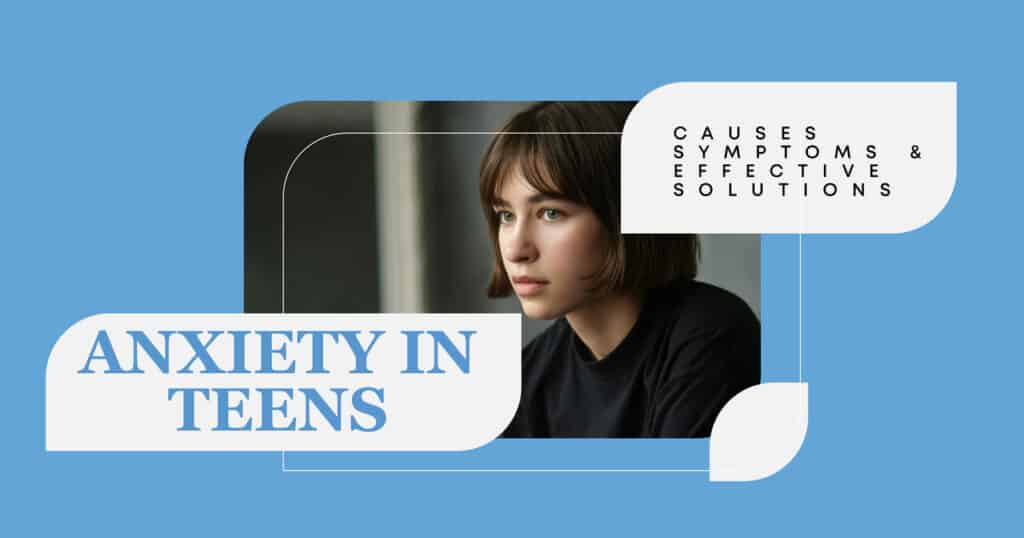Anxiety is arguably one of the most prevalent issues out of many challenges faced by adolescents. Parents, guardians, and educators need to know the causes and signs of anxiety in teens so they can provide solutions to empower them out of these difficult phases. Here’s what causes teenage anxiety, how it manifests, and the most effective way to tackle it.
What Causes Anxiety in Teens?
Teen anxiety arises from a combination of biological, emotional, and environmental influences. Break down the most common causes of anxiety:
High Expectations | A lot of pressure is on young teens to make it in the social, academic, and extracurricular areas while struggling to meet unrealistic standards that leave them very overwhelmed and inadequate. That pressure comes from the best intentions of parents and teachers. High expectations coupled with fear of failure create more than enough fuel for emotional distress among adolescents. All of these things surround them, and then one starts doubting their abilities and ends up in a vicious cycle of stress and low self-esteem. |
Hormones | With hormonal fluctuations, mood, energy levels, and emotional regulation may also be affected, and young people are more vulnerable to anxiety and stress. These feelings of anxiety have physiological components induced by hormonal surges that increase anxiety and stress in teenagers. |
Brain Development | The teenage mind has not completely developed the prefrontal cortex; the part of it that handles decision-making and impulse control is still developing. At this stage, the ability to exercise control over emotions or to analyze situations with complete rationality becomes almost impossible for a teenager, which leads to escalated anxiety symptoms. |
Parental Disapproval | Parents often expect their teens to show appreciation and affection. When the teen feels emotionally unsupported and receives constant criticism, he/she feels meaningless. This can cause anxiety in teens who are fearful of disappointing their parents. |
Peer Pressure | One of the teenager’s most decisive impulses is the need to belong to something. Wearing certain clothes, engaging in specific sports, or having a certain social status brings a lot of peer pressure. Social media does not help this. It encourages comparison and competition and adds to teenagers’ anxiety. |
Drinking and Drug Use | The abuse of substances among young people often arises as an unhealthy coping mechanism or a way to fit in with peers. Alcohol and drugs alter the chemistry in the brain, and it is capable of triggering or intensifying anxiety symptoms in teens. |
Depression | Depression and anxiety are also closely related. It is said that many youths with depression cases also have the case of anxiety. At times, treating one without dealing with the other becomes a very challenging task. |
Additional Triggers of Teen Anxiety
Academic Pressure
Increased pressure from academic achievement, standardized testing, and competition for college admissions puts a great burden on students. The fear of failing often causes anxiety in teenagers.
Traumatic Experiences
Being exposed to trauma such as bullying, family conflict, or loss makes the teen vulnerable to anxiety. The experiences need to be addressed early so that the effects do not sink too deep into their mental health.
Social Media Overload
A permanent feed of curated lives can sometimes make young teens feel insufficient. Fear of missing out and online criticism can affect a teenager’s self-esteem deeply enough to cause teenage anxiety.
Signs of Anxiety in Teens
Recognizing the signs of anxiety early is important for effective intervention. Here are some common indicators:
- A consistent worry about everyday matters.
- Avoiding social engagement.
- Inability to concentrate on schoolwork.
- Headaches, abdominal aches, or a state of weakness in the body.
- Restlessness and crankiness.
- Dysfunction in sleep.
- Abnormality of their eating pattern.
When usual activities become compulsive and interfere with daily life, it could be a clear sign of anxiety.
How Anxiety Affects a Teen’s Daily Life
Academic Performance
Concentration and memory impairment are typically a result of anxiety, and the students may struggle academically in school. Missing deadlines, skipping classes, and declining grades are some problems.
Relationships
Young people struggling with emotional distress may find it challenging to maintain friendships or communicate with family, often leading to isolation.
Physical Health
Teen anxiety can be expressed physically through fatigue, weakened immunity, or more frequent illnesses.
Long-Term Impacts
If left untreated, anxiety in teenagers is associated with more pervasive disorders that have long-lasting mental effects in adulthood, like chronic anxiety disorders or depression.
Managing Anxiety in Young Adults and Teens
Once you’ve identified the presence of anxiety or maybe the causes of anxiety, it’s crucial to address it with empathy and actionable strategies.
Open Communication
Creating a safe space for teens to express themselves emotionally is essential. Keep encouraging open dialogue and truly listen without judgment. Words such as “I am here for you” or “It is okay to feel that way” can make all the difference in helping teens understand how they feel.
Healthy Lifestyle Choices
Promoting healthy lifestyles can significantly reduce anxiety symptoms in teens:
- Sleep. Must get 8–10 hours of sleep at night.
- Nutrition. A balanced diet with all kinds of grains, fruits, and vegetables feeds the brain.
- Exercise. Physical activities cause the production of endorphins, which fight anxiety naturally.
Mindfulness Practices
Mindfulness exercises that include meditation, deep breathing, and yoga are some of the things known to reduce stress. Teaching teens these practices helps them develop the skills needed to manage teen anxiety right now.
Therapy and Counseling
Professional intervention is often necessary to address acute teenage anxiety. CBT can be very effective when teenagers identify and change their negative thought patterns. Counseling in the family can also play a role in helping your child have a more supportive home environment.
Limiting Screen Time
Spend less time on social media and other gadgets that increase the feeling of not being connected enough and comparing oneself. Encourage your teen to engage in reading, sports, or activities that spark creativity and help them relax.
Building a Support Network
Encourage teenagers to communicate with trustworthy adults, friends, or mentors to gain guidance and comfort. Teenagers with anxiety will realize that supportive groups are necessary for a solid buffer against stress.
Stress Management Techniques
Help teenagers recognize sources of anxiety and learn to manage them. This may include writing, drawing, or simply keeping a gratitude journal.
The Role of Schools in Managing Teen Anxiety
The school is the most prominent place in creating mental strength for teenagers. It is where the majority of teenagers spend their entire day. This institution can readily determine and intervene with students who have anxious minds.
Comprehensive Mental Health Resources
Schools may design excellent mental health programs that can include the following,
| On-Site Counseling Services | Licensed counselors or therapists to see students privately. |
| Support Groups | Groups that are peer-led or counselor-facilitated by students sharing their experiences within a safe, empathetic setting. |
| Workshops for Stress Management | Practical classes on how to help handle stress management techniques, which may include mindfulness, relaxation exercises, and time management to avoid the triggers. |
| Parent-Teacher Collaboration | Workshops and constant parent-teacher meetings allow parents and teachers to know how to identify and respond to the anxiety the children may be experiencing in their lives. |
Creation of Safe Spaces
Identify areas within the school where teenagers may retreat when they feel overwhelmed and create these areas to calm teenagers. The areas should include comforting resources, such as:
- Comfy chairs.
- Dim lights.
- Mindfulness tools include coloring books, stress balls, or meditation applications.
- An accessible staff member who will listen and provide instant support.
For individuals who are suffering from acute anxiety symptoms, safe spaces are essential in allowing the individual to self-soothe before returning to routine.
Mental Health Education in the Curriculum
The inclusion of mental health education in school curricula can be used to reduce the stigma associated with anxiety and encourage teens to seek help. This may include:
- Knowing what anxiety is and what triggers it.
- Awareness of early signs of mental health issues.
- Resilience and coping skills.
- Fostering empathy and peer support.
Interactive sessions, stories, and guest speakers, such as mental health professionals, would make such lessons relatable and effective for teens.
Long-Term Solutions for Teen Anxiety
There is a need for effort and a community-based approach to coping with anxiety in teens. Here are the ways for schools and communities to get along in the long haul:
Ongoing Professional Development for Educators
Teachers, as well as school staff, must be made to undergo mental health awareness continuously. This will enable teachers to identify early signs of anxiety in teens and take the right kind of approach.
Building Strong Community Partnerships
Schools can collaborate with local mental health organizations, clinics, and nonprofit groups to provide extra services and resources. This may include professional therapists, free mental health screenings, and family counseling.
Promoting Holistic Well-Being
The promotion of holistic well-being in schools helps avoid the growth of anxiety. Schools can encourage practices such as:
- Physical activities and sports for stress relief.
- Healthy eating habits promoted in cafeterias.
- Co-curricular programs where teens can exercise their creative and non-academic interests.
Anti-Bullying Initiatives
Bullying is one of the significant causes of teen anxiety. The school should introduce and have strict anti-bullying policies while having a culture of respect and inclusiveness. Programs that teach conflict resolution and empathy will reduce bullying incidents and make space safer for all students.
Overview of Anxiety in Teens
Anxiousness is the most prevailing issue among the problems of modern youth. In their roles, schools, parents, and communities undertake the tasks of fighting against all issues that contribute to creating these signs of anxiety in teens and trying to identify how there would have been if one took them seriously, symptoms of which anxiety affects teenagers.
Call to Action
If you suspect your teen might be struggling with anxiety, take that first step and help them today. Whether you call your child’s school counselor, research the mental health resources in your community, or find professional therapy, there’s always help available. Let’s work together to build a brighter, stress-free future for our teens. Make an appointment with a licensed therapist, or explore today!
FAQs
- What causes anxiety in teens?
It is due to hormonal changes, pressures, examinations, peer groups, and family problems, plus genetics may play a role. Also, social media may trigger feelings of insecurity.
- What are the signs of anxiety in teens?
Common signs include excessive worry, irritability, sleep issues, social withdrawal, and physical symptoms like headaches, stomachaches, or muscle tension.
- How can schools help with teen anxiety?
To be aware and support young people in managing anxiety, schools have to provide counseling services, safe spaces, and mental health education.
- What helps manage teen anxiety?
Managing anxiety includes therapy (CBT), mindfulness techniques, regular exercise, good routines, and open communication with trusted adults.
- When should I seek professional help?




